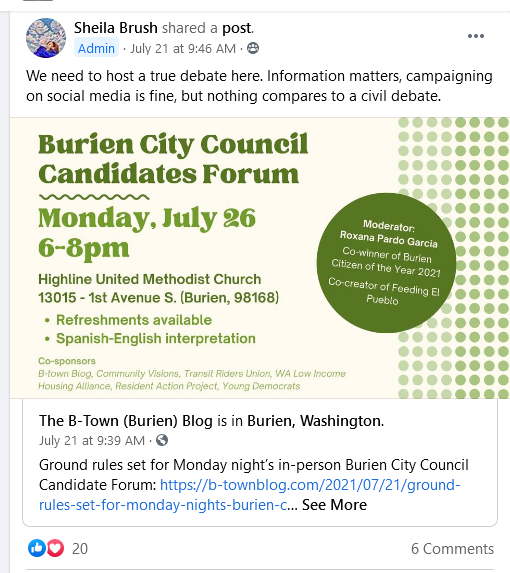This is my public testimony today before the State Of Washington Joint Legislative Audit and Review Committee (JLARC) in support of retaining the Newspaper Tax Preference. This is a tax credit benefiting local newspapers. Here is a background editorial by Seattle Times Editor Brier Dudley.
Good morning.
Sadly, I have no dog in this fight. There has been no local paper in Des Moines for almost a decade. We used to have two and both provided legitimate coverage of City Hall. I can vouch for many instances where they improved local governance.
But given the rapid decline of newspapers, those facts seems so unbelievable to me now that I may as well be telling you we used to have Space Monkeys.
Some stats…
Our City’s population has turned over by almost two thirds since the Great Recession. The average age of our residents is 39 and trending downward and 45% brown and trending upwards. However the average voter is about 58 and only getting older. And they continue to be overwhelmingly white.
Interestingly the number of voters stays relatively flat. The population changes, but it’s mostly the same type of voters from back in the day when we had newspapers. They just keep getting older.
Yes, we have a ‘Community Facebook page’ with over 5,000 members. But when it comes to local government, we are as uninformed a bunch of people as I’ve seen in my 26 years in the area. The sheer volume of posts about schools, lost animals, stolen cars and beautiful sunsets seem to make a certain percentage of residents feel ‘informed’ somehow. It’s as though what we used to call the Entertainment Section of a newspaper now is ‘the newspaper’.
For example…
- Sea-Tac Airport is beginning a massive expansion–and though the airport impacts drive our residents nuts, at least 95% of them are completely unaware that waaaaaaay more flights might be on the way or what our government may or may not be doing about it.
- Our City is embarking on a $50,000,000 Marina Redevelopment project–the largest capital project in our history. And again, almost no one in town has a clue, despite numerous City Council meeting where no one showed up.
Usually nobody attends our public meetings anymore unless I (and I mean I personally) gin up some small demand. And frankly, governments in general don’t mind that one bit because meetings move a whole lot faster without a lot of pesky residents putting in their two cents.
The small town problem…
Functionally, that lack of public participation leads to an ever shrinking circle residents driving all decision making. By that I mean maybe forty or so. These are almost all extremely well-meaning and civic-minded folks, often who have been at it now for decades, and many of them do incredible work that the City would be lost without. But whether they understand it or not, they all have an outsize role in our City’s affairs and all have self-interests. And, not to put too fine a point on it, they are also overwhelmingly old and white.
In many ways, those elites (it sounds funny to put it that way, but that really is what we’re really talking about) conjure images of the best of small town volunteerism. However, in truth we are now a $100,000,000 corporation with 32,000 other residents. We are not a small town. And at a certain point, many issues that would be routinely discussed in an objective manner at a similar-size for-profit corporation become impossible when everybody knows everybody.
And there’s the rub: nobody, especially local politicians, has an incentive to address (or even acknowledge) any of this as problematic. Even if one is willing to pay lip service to “transparency”, all the real incentives lean towards getting along and away from calling attention to it. It’s just not in your interest to promote any changes that might lead to a reduction in your influence.
If by chance one of those forty heard my remarks, they could (or perhaps should) see themselves and may well take offense. But anyone who does not live here would recognize that this state of affairs, for all its good points, has some issues.
The Good Housekeeping Seal Of Approval…
Our City publishes a very nice, four-color newsletter which is distributed to every address. That is, for the vast majority of the public, the only source of information they receive about Des Moines. And in fact, many people refer to it as ‘news’ even though it is City-generated content and almost always contains only the good news.
Also, every year your State auditors review our books and we often get very high marks. Like all cities, we advertise this loudly as some sort of Good Housekeeping Seal Of Approval. Residents understandably find this reassuring. But, not to downplay the great work of our Finance Department, what the public does not understand is that the State is not auditing the quality of our governance. The purpose is to protect your money, not ours.
In short, the only story the public tends to hear about the City is the story the City itself wants to tell.
The cure…
The combination of an uninformed population, (mostly) benign elitism and few but highly biased information sources have been significant factors in creating a lack of equitable representation in towns like Des Moines. Those same factors also make the problems resistant to self-correction.
A local newspaper is the only cure I can think of. It does far more than inform the public. By being the only actor that stays truly above the fray, a newspaper makes it possible to address some embarrassing realities we cannot seem to do on our own.
The only way to make a small town with big money functionally democratic is to give everyone a reasonable chance to participate. And the only way to do that is by giving everyone a reasonable shot at being informed. And the only way to do that is with independent and objective local journalism. In short: good government requires a newspaper.
Who knew, right?
Again, I have no dog in this fight. I’m speaking today simply to keep that possibility alive for the future of my city and for all small towns. I urge you to retain this tax credit and to do even more to make it feasible for cities like Des Moines to provide independent and objective coverage of City Hall.
Thank you.
Postscript: Honestly, I thought when I testified that my comments would be just gilding the lily. I assumed that the committee members would be “Journalism! Fantastic! Approved!” Not so much. In fact, they were surprisingly hard-nosed about extending it. They expressed what seems some very reasonable notions when considering spending public money. If they weren’t at least questioning the idea, newspapers would come to expect it and get lazy in their efforts to help themselves. They applied rigor to the task and as a taxpayer I appreciated that.




 My last union vaguely optional. The idea was to organize professional engineers to negotiate contracts with the State Of Michigan as a single unit. At the time, I thought it was kinda cockamamie because despite any merits of the idea, its success depended on the willingness of a bunch of independent-minded guys to cooperate. Candidly, we were nothing like these women or any other model of solidarity. So we self-destructed. No robots required. I now realize that it was a very worthy goal and very much ahead of its time. Some of us did better without the union, some worse. But it would have simplified very useful things like health insurance and retirement planning for all of us–things you don’t pay attention to when you think you’re special and have all the time in the world. There’s a lesson there. Maybe. 😀
My last union vaguely optional. The idea was to organize professional engineers to negotiate contracts with the State Of Michigan as a single unit. At the time, I thought it was kinda cockamamie because despite any merits of the idea, its success depended on the willingness of a bunch of independent-minded guys to cooperate. Candidly, we were nothing like these women or any other model of solidarity. So we self-destructed. No robots required. I now realize that it was a very worthy goal and very much ahead of its time. Some of us did better without the union, some worse. But it would have simplified very useful things like health insurance and retirement planning for all of us–things you don’t pay attention to when you think you’re special and have all the time in the world. There’s a lesson there. Maybe. 😀 All the airport communities really are defined by Sea-Tac Airport. If it weren’t for that property, it’s likely that most of our cities would have formed some sort of a single ‘Highline’ government decades ago. From the air there is an obvious outline of one big ‘city’ and ‘forest’. Sea-Tac Airport is like that giant foot that came down in Monty Python sketches and artificially divided the entire region. It would be much more efficient if we could somehow plan regionally for the forest and creek systems.
All the airport communities really are defined by Sea-Tac Airport. If it weren’t for that property, it’s likely that most of our cities would have formed some sort of a single ‘Highline’ government decades ago. From the air there is an obvious outline of one big ‘city’ and ‘forest’. Sea-Tac Airport is like that giant foot that came down in Monty Python sketches and artificially divided the entire region. It would be much more efficient if we could somehow plan regionally for the forest and creek systems.